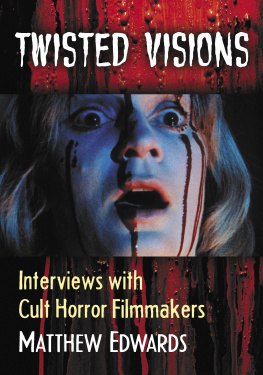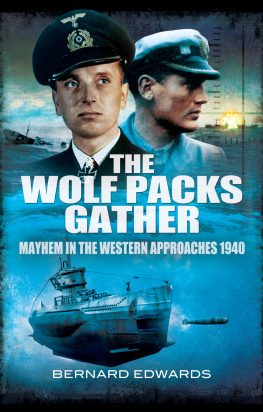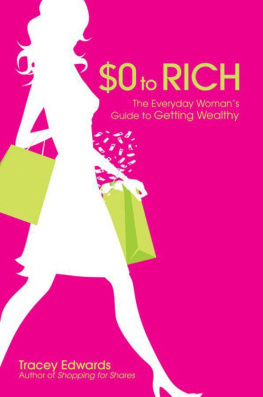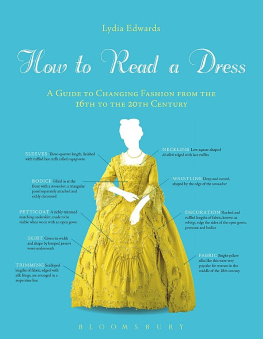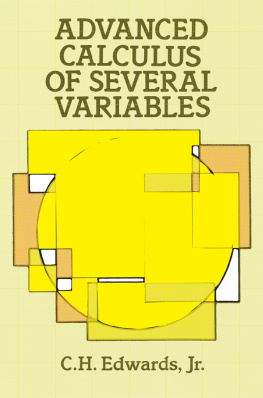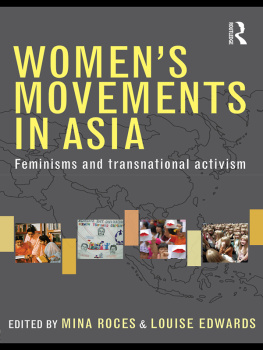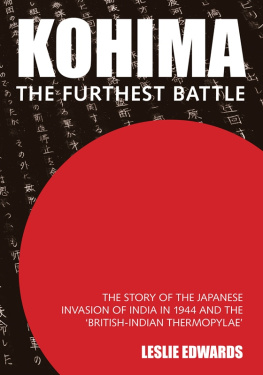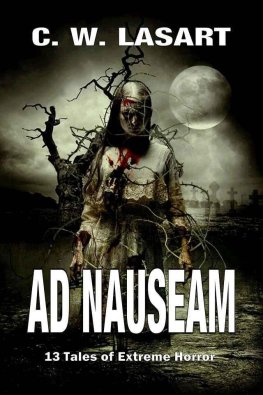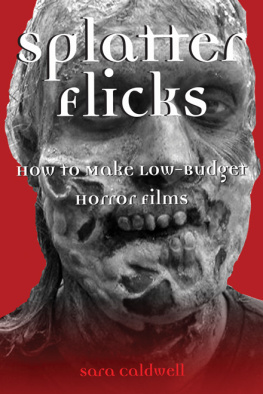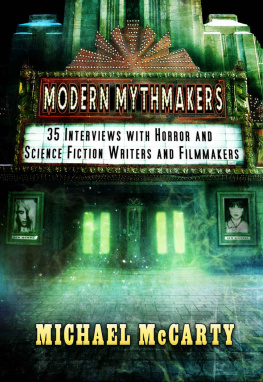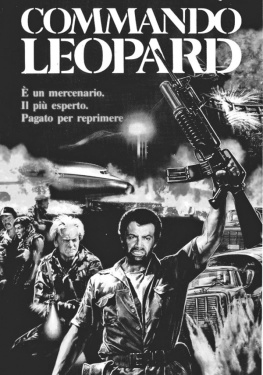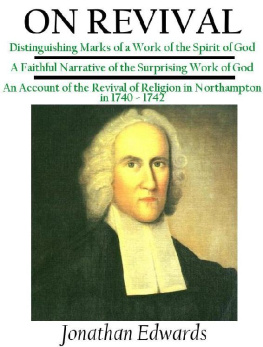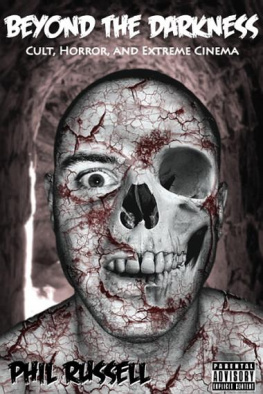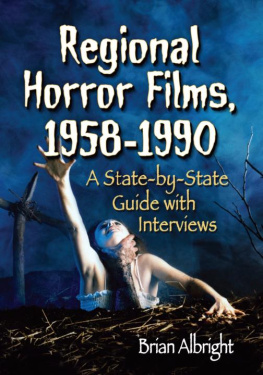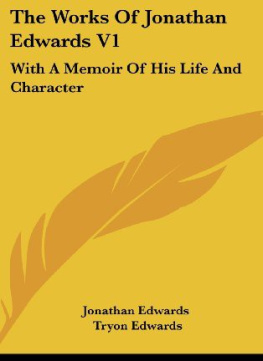Edwards - Twisted visions: interviews with cult horror filmmakers
Here you can read online Edwards - Twisted visions: interviews with cult horror filmmakers full text of the book (entire story) in english for free. Download pdf and epub, get meaning, cover and reviews about this ebook. City: Jefferson;North Carolina, year: 2017, publisher: McFarland & Company Inc;Publishers, genre: Detective and thriller. Description of the work, (preface) as well as reviews are available. Best literature library LitArk.com created for fans of good reading and offers a wide selection of genres:
Romance novel
Science fiction
Adventure
Detective
Science
History
Home and family
Prose
Art
Politics
Computer
Non-fiction
Religion
Business
Children
Humor
Choose a favorite category and find really read worthwhile books. Enjoy immersion in the world of imagination, feel the emotions of the characters or learn something new for yourself, make an fascinating discovery.
- Book:Twisted visions: interviews with cult horror filmmakers
- Author:
- Publisher:McFarland & Company Inc;Publishers
- Genre:
- Year:2017
- City:Jefferson;North Carolina
- Rating:4 / 5
- Favourites:Add to favourites
- Your mark:
- 80
- 1
- 2
- 3
- 4
- 5
Twisted visions: interviews with cult horror filmmakers: summary, description and annotation
We offer to read an annotation, description, summary or preface (depends on what the author of the book "Twisted visions: interviews with cult horror filmmakers" wrote himself). If you haven't found the necessary information about the book — write in the comments, we will try to find it.
Edwards: author's other books
Who wrote Twisted visions: interviews with cult horror filmmakers? Find out the surname, the name of the author of the book and a list of all author's works by series.
Twisted visions: interviews with cult horror filmmakers — read online for free the complete book (whole text) full work
Below is the text of the book, divided by pages. System saving the place of the last page read, allows you to conveniently read the book "Twisted visions: interviews with cult horror filmmakers" online for free, without having to search again every time where you left off. Put a bookmark, and you can go to the page where you finished reading at any time.
Font size:
Interval:
Bookmark:

ALSO EDITED BY MATTHEW EDWARDS
AND FROM MCFARLAND
Klaus Kinski, Beast of Cinema: Critical Essays and Fellow Filmmaker Interviews (2016)
The Atomic Bomb in Japanese Cinema: Critical Essays (2015)
Film Out of Bounds: Essays and Interviews on Non-Mainstream Cinema Worldwide (2007)

McFarland & Company, Inc., Publishers
Jefferson, North Carolina
LIBRARY OF CONGRESS CATALOGUING DATA ARE AVAILABLE
BRITISH LIBRARY CATALOGUING DATA ARE AVAILABLE
e-ISBN: 978-1-4766-2814-1
2017 Matthew Edwards. All rights reserved
No part of this book may be reproduced or transmitted in any form or by any means, electronic or mechanical, including photocopying or recording, or by any information storage and retrieval system, without permission in writing from the publisher.
Front cover: Joanna David as Angela Paradise in the 1984 cult film Sleepwalker (Saxon Logan)
McFarland & Company, Inc., Publishers
Box 611, Jefferson, North Carolina 28640
www.mcfarlandpub.com
Dedicated to my parents
for their continued support of my writing career
and all aspects of my life
This book would not have been possible without the help of my family and friends and the interviewees and contributors who participated in this book. I would like to thank Marcus Stiglegger and Johannes Schnherr for contributing their brilliant interviews. It has been a pleasure working with again and an honor to have them in this collection. I would also like to thank all the interviewees.
I would also like to express my gratitude and thanks to David Geevanathan for the superb translations of the Higuchinsky and Yoshihiko Matsui interviews from Japanese to English. Without him, it would not have been possible to undertake such an in-depth interview with these directors.
Thank you also to my Mum and Dad and my brothers Paul, Mark and Daniel for their support during the production of this book and with my writing. Thank you to Doug and Rosemary for listening to me witter on about these crazy horror films. Special thanks also to Mimi the cat, to my nieces Lily, Poppy, Naomi and Eliza, and to Mandy and Kate. Thank you also to Patrick Prescott for his support in my writing endeavors and for continuing to spread the word about my books.
Last but not least, a huge thank you to my wife Johanna for her love and support during the writing of this book and for allowing me to watch hours and hours of horror cinema and to spend time transcribing the interviews. Without her, the book would not have been completed.
To those less receptive to the joys of the horror film, or Twisted Cinema, I have always found it difficult to articulate the immense enjoyment that one can derive from these movies. Mainstream Hollywood cinema relies on the flamboyant and movies laden with special effects, star names and huge budgets. Commerce and entertainment are now its driving principles, as opposed to genuinely trying to communicate with its audience. In Hollywood, the marketing of the movie has become more important than the quality of the film. If a film executive has 30 seconds of decent high-impact footage to make a trailer to entice punters into multiplexes, then that is deemed a success. Raking in the dollars, making a profit is the name of the game in any cinematic venture, but in Hollywood, profit comes at the expense of the art-look-tone-mood of the film itself. Hollywood uses the mono-form as its cinematic blueprint. The images and sounds are presented in such a frenzied and bombastic manner that it stifles an audiences ability to process what theyre watching. Rapid editing, its use of sound and music to dictate the mood and feelings of the audience, and the conventional approaches to narrative, camerawork, lighting and direction, have all contributed to a standardization of what is deemed normal or accepted practices in filmmaking.
For this reason, over time I have become more disillusioned with mainstream cinematic fare and I have sought to find films and filmmakers from a European or world perspective to connect with. I have looked toward directors such as Abel Ferrara, David Lynch, Werner Herzog, Bla Tarr, Andrei Tarkovsky and Peter Watkins, toward Japanese, Russian and New Wave Eastern European films in order to find solace. Yet it isnt just art house cinema that resonates with me, because I have always found solace in exploitation, horror, Hong Kong action and trash cinema. Positioned at the other end of the cinematic spectrum, these horror-trash filmmakers, often maligned (by those who cant comprehend a cinema other than the mono-form dished out to them by Hollywood and mainstream media corporations), have sought to stick two fingers up to the establishment and make films that dont fit into the neat little packages theyre expected to fit into. Horror cinema has always been at the forefront of this vanguard, pushing boundaries, experimenting and challenging audiences.
These films not only entertain, they provided scares, thrills and genuine horror while articulating themselves in ways opposed to the mono-form in artistic and unconventional ways. They set out to communicate with the audience our darkest fears and utilize different cinematic tropes or approaches to get their messages across. John Carpenter (Halloween, The Fog), Sam Raimi (Evil Dead), Dario Argento (Suspiria), Mario Bava (Blood and Black Lace) were able to create new, exciting films that made audiences sit up and take note. Films with their own unique identities. Films that scared us shit-less.
My love of horror developed at an early age from being terrified by Karl Freunds The Mummy (1932) before progressing onto the Hammer horror films. By my teens I had discovered the Italian giallo and American slasher films before splintering off to enjoy all facets of the horror genre, soaking up plenty of twisted and off-the-wall pictures in between, while immersing myself in the legendary horror magazines Rue Morgue, Fangoria and The Dark Side and the now defunct U.K. publications Fear and Shivers. They provided my horror fix and introduced me to new films and filmmakers. My parents helped feed this love of horror in myself and my three brothers by allowing us to rent 18 and over films (similar to the NC-17 rating in the U.S.) from rental outlets and purchasing controversial classics films like Henry: Portrait of a Serial Killer and Man Bites Dog from high street stores. (The thing that always makes me laugh about us watching violent crazy films like this is that my dad was a police sergeant and it was illegal for underage children to watch them! My Dad bought Henry: Portrait of a Serial Killer for me during his lunch break when patrolling the streets of Bath. I still find it amusing to think of my dad in his police uniform buying Henry: Portrait of a Serial Killer!)
From this love of the genre, and my own interest in interviewing film directors, I decided to put together an anthology covering a wide spectrum of horror cinema for fans who enjoy strange and offbeat cinema. The people within these pages have been chosen because I feel that they have contributed significantly to the genre and their films have strayed away from the mono-form and standardized practices as their goal was to make something truly original, terrifying, gross, experimental or groundbreaking. Films that were created for horror-exploitation fans, giving them what they couldnt get from the big studios. Inside you will hear stories of the hardships these filmmakers endured to realize their visions. The graft, the setbacks, the vicious attacks from the mainstream press who ridiculed and censored some of their films upon their initial release. You will find
Next pageFont size:
Interval:
Bookmark:
Similar books «Twisted visions: interviews with cult horror filmmakers»
Look at similar books to Twisted visions: interviews with cult horror filmmakers. We have selected literature similar in name and meaning in the hope of providing readers with more options to find new, interesting, not yet read works.
Discussion, reviews of the book Twisted visions: interviews with cult horror filmmakers and just readers' own opinions. Leave your comments, write what you think about the work, its meaning or the main characters. Specify what exactly you liked and what you didn't like, and why you think so.

